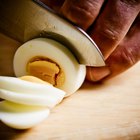
Serving eggs at a breakfast or brunch buffet can be a challenge. Cooking your eggs incorrectly, or with the wrong equipment, can cause reactions that make your eggs appear green or gray in color. Adding lemon juice before you scramble your eggs can help prevent the color changing.
Why Scrambled Eggs Turn Green
When serving a large group, a buffet can provide enough food for everyone without the need to spend all of your time in the kitchen. Breakfast is a fairly simple buffet to set up, but there are special challenges when it comes to scrambled eggs. When scrambled eggs sit for a while, they tend to turn green or gray. This is a chemical reaction that happens as hydrogen sulfide in the egg white reacts with the iron in the yolk to form iron sulfide. The eggs are perfectly safe to eat like this, the problem is, they look unappetizing.
Equipment and Temperature
Stay away from cast iron or aluminum utensils and serving trays to mitigate the chemical reactions that cause green eggs. Cooking your eggs in a nonstick skillet can help you achieve the same results big restaurants achieve with their stainless steel equipment. Cook your eggs in small batches -- never scramble more than a dozen eggs at a time. Make sure the spatula and utensils you use to cook and serve are not aluminum. Heat-resistant rubber scrapers are a good choice for cooking scrambled eggs in a nonstick skillet.
How you serve your eggs can also cause issues. Eggs should be held in a double-boiler type setup, never over direct heat or left in the skillet on the stove. Set up a double boiler of sorts and boil some water in a kettle and pour it into a cake pan, then set another ceramic dish in the warm water and place your eggs inside the ceramic dish. This keeps the dish, and eggs, warm without direct heat.
Lemon Juice and Scrambled Eggs
Lemon juice is a chemical reaction neutralizer. If you place sliced fruit in water with lemon juice, it can help keep the cut fruit from turning brown. The process that turns fruit brown is the same type of chemical reaction that is turning your eggs green or gray. By adding a bit of lemon juice to your scrambled eggs before cooking, you can stave off the chemical reaction without impacting the taste. The American Egg Board recommends 1/8 teaspoon of lemon juice for every 12 eggs you scramble.
Scrambled Egg Handling and Cooking Tips
Along with using the right equipment and adding lemon juice to your eggs, storage techniques and time limits are also important. First, always use extremely fresh eggs to hold off the green or gray tinge on your scrambled eggs. The fluffiest and tastiest scrambled eggs are cooked slowly, over lower heat. Ensure you're not letting your eggs sit more more than one hour after you've cooked them. If you have an instant-read thermometer, you can check the temperature of the eggs you're keeping warm. The minimum acceptable temperature is 140 degrees Fahrenheit, but be careful they're not much hotter than that or the taste will be affected. The longer your scrambled eggs sit, the more unappealing they'll become, fresh eggs, cooked in small batches will be scooped up and eaten much more quickly by your family and guests.
Related Articles

How to Prevent Dark Circles in Hard ...

Can You Eat Hard-Boiled Eggs Even ...

Shelf Life of Hard Boiled Eggs
How to Make an Overeasy Egg

How to Make Your Deviled Eggs Look Great
How to Cook Scrambled Eggs Using a Slow ...
How do I Keep Scrambled Eggs From ...

How to Cook Eggs Sunny Side Up Without ...
How to Fry an Egg Without It Turning ...

The Best Types of Pans to Cook ...

How Are Egg Sizes Determined?

How to Cook Catfish Eggs

Can You Eat a Broken Egg?

Using a Convection Oven to Cook ...

How to Freeze Raw Eggs

How to Cook Eggs With a Microwave ...

How to Make Powdered Eggs
Simple and Delicious Egg Salad Recipe

My Hard-Boiled Eggs Are Soggy in the ...

Can You Hard Boil a Broken Egg?
References
Writer Bio
Carrie Hill has been cooking since she could drag a chair into the kitchen. Learning from her mother, she began a lengthy career as a self-taught home cook. An experienced food blogger, Hill loves writing and photographing food to make it approachable for home cooks with no experience or with accomplished skills.
Photo Credits
George Doyle/Stockbyte/Getty Images